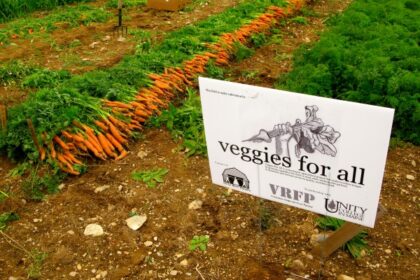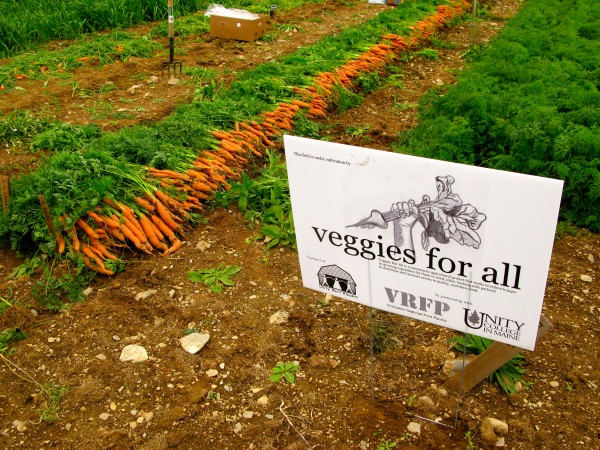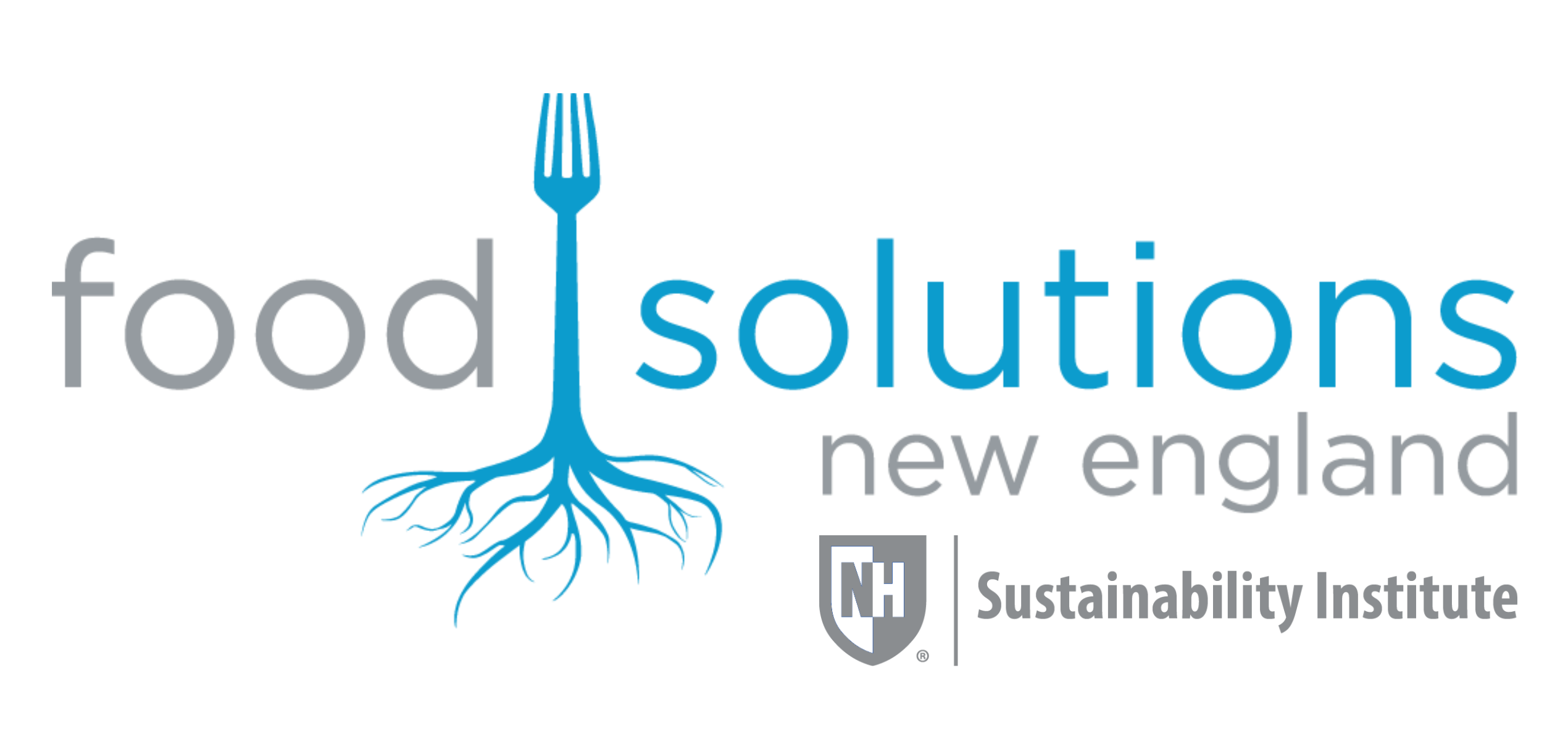
 Overview
Overview
Campuses across the country have seen an increasing interest in food systems and farming from students and faculty, which has led to the creation of new majors and minors related to food and agriculture, as well as an increase in on-campus food production. There are a variety of outlets for the food that is produced on campus, including selling or giving it to campus dining operations, creating campus-based CSA programs for students and employees of the college, or using the opportunity to address food access and hunger in the community or communities surrounding the campus.
Unity College is one the campuses that has chosen to work with their community on food access as a part of their campus food production efforts. They formed a partnership in 2009 with an organization called Veggies For All in rural Maine, which works to relieve hunger by growing vegetables for those in need, while collaborating with partners to distribute and increase access to quality and nutritious food. This partnership provides thousands of pounds of food to hundreds of clients of the local food bank, the Volunteer Regional Food Pantry, and provides educational opportunities for students. In 2014 VFA became a project of Maine Farmland Trust, which hopes to expand the model and support food bank farming statewide.
Institutional Profile
Institution Name: Unity College
Institution Location: Unity, ME
# of Students: 573
Proximity to Farmland: within ½ mile
Organizational Profile
Organization Name: Veggies For All
Organization Location: Maine Farmland Trust, Unity, ME
# of Employees: two, plus a seasonal intern
The Story
With the help of Unity Barn Raisers, several aspiring farmers in Waldo County, Maine began a fledgling food bank farm project called Veggies For All (VFA) to help address food access in the community in 2007; in 2009 the project was relocated to the campus of Unity College, where additional resources and support were provided to continue their work. Unity College was looking to expand its on-campus food production at this time in tandem with its developing sustainable agriculture program, so Veggies For All became the driving force for expanding infrastructure and staffing related to the production of food on campus.
Bringing Veggies For All onto Unity College’s campus provided a needed boost to the project, but it also provided a benefit to the campus via educational opportunities and engagement with the community. Faculty help to facilitate student involvement through including it in their classes, with 9 classes engaged in the work of VFA on campus in 2013. Students serve as volunteers and pre-professional consultants to help to analyze problems that arise, such as studying nutrient flow as a case study for a soil fertility course. Staff who are involved with the project also speak with classes about issues of hunger and food justice to help demonstrate the need for projects like VFA and overall food system reform. VFA offers internships and other positions to students and because of high-level campus support, it is part of the campus story that is offered to incoming students, prospective students, and other audiences.
VFA’s production focuses on hardy crops such as onions, carrots, potatoes, cabbage, and winter squash. The project also experiments with smaller crops grown to trial seeds for a local seed company or for special projects requested by clients such as swiss chard, kale, and green beans. In addition to supplying food banks, VFA also meets with Unity College Dining Services in order to estimate what they might use the following year on campus, and that amount is reserved and stored for their use. Dining Services has historically received support to purchase products from VFA through the Sustainability Office.
In 2012 and 2013, Dining Services at Unity College utilized a total of 800 pounds of onions, 365 pounds of carrots, 325 pounds of potatoes, and 195 pounds of winter squash from Veggies For All – a cumulative total of over 1,725 pounds.
VFA worked closely with emergency food services organizations and their staff in the beginning to build trust and develop effective communication methods in order to ensure that pantries and their clients would utilize the resource. Some did not typically handle fresh produce, but over time as the relationships were built and processes developed, VFA was able to successfully increase the amount of local fresh food provided to the pantries. These successful partnerships between Unity College, Veggies For All, local landowners, and the Volunteer Regional Food Pantry have allowed for thousands of pounds of fresh produce to be delivered and consumed by rural Maine residents.
Fresh Produce Donated to Food Pantries by Veggies For All

The Structure
VFA is a project of Maine Farmland Trust, but has close partnerships with Unity College as their physical host site, and also with the Volunteer Regional Food Pantry as their key food distributer. Unity College has also assisted with fundraising and infrastructure development. VFA has produced over 100,000 pounds of produce during the lifetime of the project, with roughly 75,000 pounds produced since their initial growing season at Unity College in 2010.
Tim Libby, who helped create VFA, serves as farm manager for the organization, and works closely with Sara Trunzo. Sara, a student at Unity who had been actively engaged in the campus farming and gardening efforts, graduated in 2008 and shortly thereafter took on an Americorps VISTA position on campus for two years that focused on community food security. Sara continued her work on this project beyond the VISTA term as a member of the college sustainability office and has since become the director of Veggies For All as a part of Maine Farmland Trust.
Students participate with VFA and other campus food production efforts through some of their courses, but they can also be involved through an internship offering each year. Typically the intern is a student from the Sustainable Agriculture Program, but community members can also take on this position. A project advisory committee helps to oversee VFA, and the Director of the Sustainable Agriculture Program is a part of this committee, along with key representatives of hunger relief agencies, community organizations, seed purveyors, and other individuals with agricultural or hunger relief expertise.
The food that is grown for Veggies For All is currently produced on three acres. Of those three acres, 1.25 acres are on Unity’s campus in several different plots. The other acreage is either in the form of a donated lease or a multi-year agreement with a landowner. VFA has had contractual relationships with three landowners thus far over the course of the project’s existence, and each year the project has scaled up slightly. Sometimes the pieces of land that are being used are switched based on access or convenience, and in order to concentrate space more closely, VFA is currently only working with two landowners. The landowners who are involved with the project are enthusiastic about the partnership. There is limited space for growing on campus beyond what is currently being used, but the project is likely to continue to expand and there is additional land that could be used locally.
With grant funding and support from the college, Veggies For All and Unity College co-developed agricultural infrastructure and equipment.
This includes a 1,008 square foot greenhouse, a 6,000 cubic foot root cellar, a 40hp CUT (compact utility tractor), a variety of small equipment, and a wash and pack shed slated for completion summer 2014.
In addition to campus infrastructure at Unity College, Veggies for All has helped to create momentum and a need for processing or storage infrastructure at local food banks, such as the installation of a walk-in cooler for storing fresh produce. A local food bank was able to secure funding for a small kitchen, and they chose to design it so that they could easily blanch and freeze fresh vegetables like the swiss chard and kale that VFA later grew for them.
Most of the produce from VFA is distributed between August and February, with the goal of producing enough to deliver once per month to the food banks during this time period. VFA also hopes to distribute produce further into the spring, when other crops are less available.
Lessons Learned
Although students have always been excited and supportive of the idea of a food bank farm at the college, they seem to be most supportive when the food is actually produced right on campus. They are less excited about the plots that are located off campus, but the production of food off campus is not likely to change given that available land to grow food is readily accessible nearby.
There were many lessons learned about the best way to partner with the food banks and engage the people who benefit from the food banks in the most effective way. Through some difficult situations and a lack of understanding about delivery schedules, there were times where perishable products could not be delivered to the large number of people they were meant to serve. Since then, VFA and the food banks have developed better methods to communicate about delivery dates and times as well as storage, including setting up a monthly delivery schedule that has also allowed area farmers to more easily donate to the food banks as well. The supply that was needed for the customers of the food banks was also surprising in that the food bank that VFA works with provides food to 800 people directly, and another 700 through sharing resources with other pantries.
Simply making the fresh produce available did not mean that the customers of the food pantry were informed with the skills needed to prepare fresh produce. VFA and the food bank developed and now offer resources such as a monthly newsletter and classes that share information on how to prepare the food that is offered. They also offer a gardening class and provide information online through the creation of a Facebook page and website, which previously did not exist. In order to get attendance at the classes, it often requires incentives such as providing donations of items such as seeds, canning jars, or similar items that link the education being offered.
Resources
Initiative Partners
Veggies For All
Unity College Sustainability
Veggies For All at Unity
Maine Farmland Trust, Farm Viability
Volunteer Regional Food Pantry
Other College Campuses Growing Food for Food Banks
University of Montana PEAS Farm
Dickinson College Farm
The Farm at Stonehill College
Reuters Article on College Efforts to Address Hunger through Food Production
Green Mountain College Farm and Food Project
UC Davis Student Farm
Yale Sustainable Food Project
Contacts
Farm to College Project Manager: Riley Neugebauer, riley@farmtoinstitution.org
Farm to College Project Maine Lead: Ken Morse, kenmorse@mac.com
Case Study Contacts: Sara Trunzo, Director, Veggies For All, strunzo@mainefarmlandtrust.org; Tim Libby, Farm Manager, Veggies For All, tlibby@mainefarmlandtrust.org




